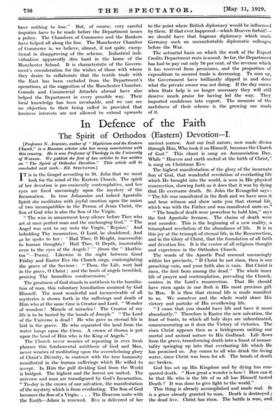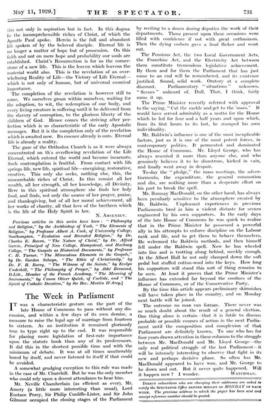In Defence of the Faith
The Spirit of Orthodox (Eastern) Devotion—I.
[Professor N. Arseniev, author of "Mysticism and the Eastern Church," is a Russian scholar who has many associations with this country. He is now Professor of Theology in the University of Warsaw. We publish the first of two articles he has written on " The Spirit of Orthodox Devotion." This article will be concluded next week.—Ed. SPECTATOR.] T is in the Gospel according to St. John that we must I look for the mind of the Eastern Church. The spirit of her devotion is pre-eminently contemplative, and her eyes are fixed unceasingly upon the mystery of the Incarnation. In true Johannine and indeed Apostolic Spirit she meditates with joyful emotion upon the union of two incompatibles in the Person of Jesus Christ, the Son of God who is also the Son of the Virgin.
" The wise in amazement keep silence before Thee who art at once perfect man and the unchanging God." " The Angel was sent to say unto the Virgin, ' Rejoice.' And beholding Thy incarnation, 0 Lord, he shuddered. And so he spoke to her : Hail Thee, 0 Height, inaccessible to human thoughts ! Hail Thee, 0 Depth, inscrutable even to the eyes of the Angels ! ' " (from the " Akathis- tos "—Poem). Likewise in the night between Good Friday and Easter Eve the Church sings, contemplating the grave of the Saviour : " Thou, the Life, wert laid in the grave, 0 Christ ; and the hosts of angels trembled, praising Thy boundless condescension."
The greatness of God stands in antithesis to the humilia- tion of man, this voluntary humiliation assumed by God Himself. The most wonderful and inconceivable of all mysteries is shown forth in the sufferings and death of Him who at the same time is Creator and Lord. " Wonder of wonders ! Miracle of miracles ! The Creator of my life is to be buried by the hands of Joseph." " The Lord of the Universe is dead ! He who gave us eternal life is laid in the grave. He who separated the land from the water hangs upon the Cross. A crown of thorns is put upon the head of Him who is the King of Angels."
The Church never wearies of repeating in ever fresh phrases this fundamental antithesis of God and Man, never wearies of meditating upon the overwhelming glory of Christ's Divinity, in contrast with the true humanity Manifested in the human sufferings which He willed to accept. In Him the gulf dividing God from the World is bridged. The highest and the lowest are united. The universe and man are transfigured by God's Incarnation. " To-day is the crown of our salvation, the manifestation of the mystery which is from everlasting. The Son of God becomes the Son of a Virgin. , . . The Heavens unite with the Earth—Adam is renewed, Eve is delivered of her ancient sorrow. And our frail nature, now made divine through Him, Who took it on Himself, becomes the Church of God." This chant is sung on Annunciation Day. While " Heaven and earth united at the birth of Christ," is sung on Christmas Eve.
The highest manifestation of the glory of the incarnate Son of God, that wonderful revelation of everlasting life which He brought into the world, is seen in His physical resurrection, showing forth as it does that it was by dying that He overcame death. St. John the Evangelist says : " The life was manifested in the flesh and we have seen it and bear witness and show unto you that eternal life, which was with the Father and was manifested unto us."
" The bonds of death were powerless to hold him," says the first Apostolic Sermon. The chains of death were rent asunder. This is the beginning of a new reality, a triumphant revelation of the abundance of life. It is in this joy at the triumph of eternal life, in the Resurrection, and in the Glory of Christ, that the foundation of all faith and devotion lies. It is the centre of all religious thought and experience in the Orthodox Church.
The words of the Apostle Paul resound unceasingly within her precincts, " If Christ be not risen, then is our preaching vain, and your faith also is vain. But Christ is risen, the first from among the dead." The whole inner life of prayer and contemplation, pervading the Church, centres in the Lord's resurrection. That He should have risen again in our flesh is His most precious gift to Man. It is thus that eternal life is made manifest to us. We ourselves and the whole world share His victory and partake of His overflowing life.
" I came that you should have life and have it more abundantly." Therefore is Easter the new salvation, the feast of feasts, to which all holy days are subordinated, commemorating as it does the Victory of victories. The risen Christ appears then as a bridegroom uniting our mortal and animal nature to His Godhead. Life flows from the grave, transforming death into a fount of immor- tality springing up into that everlasting life which He has promised us. Joy comes to all who drink the living water, since Christ was born for all. The bonds of death are broken.
God has set up His Kingdom and by dying has con- quered death. " How great a wonder is here.! How can it be that He who is the life of us all has Himself tasted Death ? It was done to give light to the world."
This thing is already accomplished and made real. It is a grace already granted to man. Death is destroyed ; the dead live. Christ has risen. The battle is won, and this not only in aspiration but in fact. In this dogma lie the incomprehensible riches of Christ, of which the Apostle Paul spoke. Herein is the full and abundant life spoken of by the beloved disciple. Eternal life is no longer a matter of hope but of possession. On this faith and not on mere hope and probability our souls are established. Christ's Resurrection is for us the corner- stone of a new life. This is the leaven which leavens the material world also. This is the revelation of an over- whelming Reality of Life—the Victory of Life Eternal— which is not only of human, but of universal cosmical importance.
The completion of the revelation is however still to come. We ourselves groan within ourselves, waiting for the adoption, to wit, the redemption of our body, and every living creature is suffering until it be delivered from the slavery of corruption, to the glorious liberty of the children of God. Hence comes the striving after per- fection which is so characteristic of the early Apostolic messages. But it is the completion only of the revelation which is awaited now. Its essence already is ours. Eternal life is already a reality.
The gaze of the Orthodox Church is as it were always concentrated on th's overflowing revelation of the Life Eternal, which entered the world and became incarnate. Such contemplation is fruitful. From contact with life springs life, new life, spiritual life—energizing, restorative, creative. This only she seeks, nothing else, this, the unsearchable riches of Christ. In this consist all her wealth, all her strength, all her knowledge, all Divinity. Here in this spiritual atmosphere she finds her holy food, and finds, not only the source of her prayer, praise, and thanksgiving, but of all her moral achievement, all her works of charity, all that love of the brethren which is the life of the Holy Spirit in her. N. ARSENIEV.
Previous articles in this series have been : " Philosophy 2nd Religion," by the Archbishop of York, " The Elements of Religion," by Professor Albert A. Cock, of University College, Southampton, " Evolution and Revealed Religion," by Dr. Charles E. Raven, " The Nature of Christ," by Dr. Alfred Garvie, Principal of New College, Hampstead, and Hackney College, " The Gospels as Historical Documents," by Professor C. H. Turner, " The Miraculous Elements in the Gospels," by Dr. Gordon Selwyn, " The Ethic of Christianity," by Dr. F. R. Barry, " The Witness of the Saints," by Evelyn Underhill, " The Philosophy of Prayer," by Abbit Bremond, D.Litt., Member of the French Academy, " The Meaning of Sacraments," by Canon Oliver Quick, of Carlisle, and " The Spirit of Catholic Devotion," by the Rev. Martin D'Arcy.]











































 Previous page
Previous page